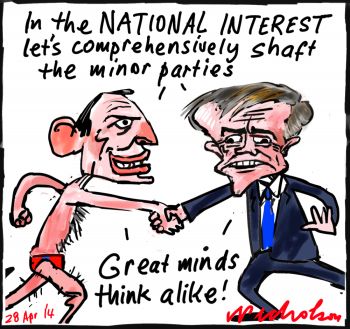Search
Democracy Links
Member's Off-site Blogs
'blinky bill' .....

Back in July, Australian Opposition Leader Bill Shorten delivered a speech at the Australian American Leadership Dialogue at the New York academy of sciences. It was full of motherhood statements – “We are bonded, we are blood cousins” – praise for Israel’s “innovation” (no mention of the Palestinians) and clichéd rhetoric about a pioneering American “legacy” that inspires Australians.
The assembled journalists would have clapped with appreciation, though the vast bulk of the event went unreported. It’s extremely rare for any journalist to criticise the meeting. If they do, their invitations from the US lobby tend to get lost in the mail.
Shorten’s kowtowing to Washington made it unsurprising that he offered his support for Tony Abbott involvement in Obama’s new Middle East conflict, but then again, this is how we’re expected to behave in a US client state.
Our politicians and journalists are duchessed with countless conferences and overseas trips. They’re the willing subjects of endless lobbying, “insider access” and so on. Then there’s the dinners, lunches, breakfasts and off-the-record chats with the cream of the US establishment.
The drip-feed is addictive and consequently the public often receives little more than press releases dressed up with a byline. Even questioning last week’s Australian anti-terror raids brings condemnation. Get with the program - repeat the word “terror” - ask questions never.
So many editors, journalists, politicians and advisors have attended the conferences and forums at the heart of the US-Australia relationship that it’s almost better to ask who hasn’t been, and to thank them. The Australia-Israel Leadership Forum, modelled on the Australian American Leadership Dialogue, has attracted huge numbers of politicians in recent years.
The same month that Shorten was extolling the virtues of the US in New York, Christopher Pyne, the education minister, visited Jerusalem for another leadership forum, which also included the UK. He praised Israel like an excited school-boy and used the word “freedom” 20 times in a very short speech.
Australian politicians and media courtiers constantly praise the “shared values” between Australia and Israel (though it’s clear what values a brutal military occupation of Palestine represents). A rare exception was the former foreign minister Bob Carr, who caused a storm earlier this year when he condemned the extremism of the Zionist lobby, saying that it was damaging Israel’s future. Less was said about Palestinian viability.
Carr was immediately pounced on by both his political enemies and allies – standard practice for critics of Australia’s closeness to the US or Israel. Former Labor leader Mark Latham was similarly condemned after he apparently risked the US alliance by correctly, in my opinion, stating in 2005 that our incestuousness with Washington made us more of a terrorist target. Former prime minister Malcolm Fraser is another of the few high-profile political figures who write honestly about the true nature of the alliance, and he’s in his 80s.
Just how deep does the connection go? Wikileaks cables released in 2010 revealed the long list of Liberal and Labor politicians lining up to praise the US alliance. Many of them were upset that their overly close ties with Washington were exposed in the public domain.
After the cables were released, the Lowy Institute’s Michael Fullilove argued that the cables showed a benign US and resented diplomatic embarrassments being made public. Former Labor politician Stephen Loosley, who writes glowingly about the US, claimed the cables would have a “chilling impact in terms of people speaking very frankly.” Former foreign minister Alexander Downer also talked about “embarrassing” revelations.
A rare voice of establishment dissent came from Paul Barratt, a former intelligence analyst and former secretary of the Department of Defence. He worried that public trust was breached by Australian politicians so uncritically accepting the goals of two foreign powers, Israel and America.
Canberra is described in the Wikileaks documents as “rock solid”, but uninfluential on American thinking. Obsequiousness is Canberra’s permanent stance. Australian academic Hugh White offered a pithy comment on the depth of the unequal relationship:
“I guess what’s striking about it though is how hard people in the Labor Party, people in Australian politics in general, work at being liked by the Americans, and there’s nothing wrong with being liked by the Americans, but what strikes me about what we’ve seen in the WikiLeaks saga so far is so little evidence of us asking for something back.”
Even David Kilcullen, the Australian counter-terror expert, said this week that an open-ended conflict was a “concern” and Australia “should be pushing for a pretty definite end [date]” to any new Iraq conflict, though he’s been an active supporter and advisor of failed, US-led policies in Iraq and Afghanistan for years.
In the parallel universe of Washington talking points created by the US-Australia alliance, Obama’s war is about the “battle for hearts and minds” in the Islamic world, not the brutal reality of US policy on the ground in Syria, Iraq, Yemen or Somalia. Alternatives to bombing yet more Arab nations are plentiful if we care to look – but we don’t.
An independent foreign policy requires Australia recognising it has never really become a sovereign nation. The bravado over Isis shows the political elite prefers to live in Obama’s shadow.
Of course Australia is going back to Iraq. That's how a US client is expected to behave
- By John Richardson at 24 Sep 2014 - 11:44pm
- John Richardson's blog
- Login or register to post comments
Recent comments
3 hours 18 min ago
9 hours 9 min ago
10 hours 7 min ago
10 hours 15 min ago
10 hours 23 min ago
12 hours 47 min ago
14 hours 8 min ago
16 hours 33 sec ago
1 day 10 hours ago
1 day 12 hours ago